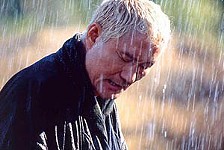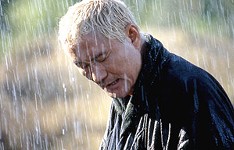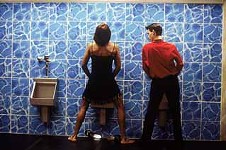Sonatine
1993, R, 94 min. Directed by Takeshi Kitano. Starring Takeshi Kitano, Tetsu Watanabe, Masanobu Katsumura, Aya Kikumai.
REVIEWED By Russell Smith, Fri., July 17, 1998
In a traditional gangster movie, the phrase, “This means all-out war” triggers a very specific set of expectations about what's to follow. But Japanese director Takeshi “Beat” Kitano doesn't truck with conventional wiseguy dramas. So, while a requisite number of Versace suits do get ventilated by 9mm slugs in the course of this story, and while various stock characters and situations do come into play, little else about Kitano's fourth film (shot in 1993 but just now seeing U.S. release) belongs in the same conceptual or attitudinal galaxy as The Public Enemy or The Godfather. Instead, as in his most recent film, Fireworks, Kitano seems far more interested in the arbitrary, ritualistic aspects of criminal society than the macho Sturm und Drang that generally animates the genre. The underworld portrayed in Sonatine is as rigidly patterned and deterministic as an ant colony. Protagonist Murakawa (Kitano), a mid-level Tokyo yakuza functionary, has lost his zest for the job but can't imagine a way out. When his boss packs him and a hastily recruited band of young punks off to Okinawa to help an allied gang in a local skirmish, he suspects a setup. Yet, bound by a code that supersedes every consideration of common sense (saving one's hide, etc.) he takes the assignment anyway. Once in Okinawa, Marakawa and company find the rumble at an impasse and wind up cooling their heels in a cozy beach house waiting for the other side to make its move. The energy intended for wasting their rivals is now redirected into a bizarrely whimsical series of games and rituals involving everything from firearms to Frisbees -- with little apparent recognition of their qualitative difference. During this long middle act, the gang war is all but forgotten. Time passes as if in a dream, albeit one with an absurdly structured feel. The dead-souled Murakawa, already staring into some kind of personal void, is pushed even closer to the brink by these experiences, which force him toward an inevitable day of reckoning. This is the existentialist spin Kitano seems to enjoy putting on his stories. And in many ways Sonatine feels like a rehearsal for the richer, more visually and thematically rewarding Fireworks. Kitano, a hydra-headed cultural phenomenon who also dabbles in standup comedy, literature, painting, and journalism, is a filmmaker with a clear, ever-evolving vision. Based on what I've seen of his work, he appears not to give a rat's ass about genre traditions, narrative convention, or the alleged necessity of providing big emotional payoffs for the audience. If you feel hostile toward art that not only confuses you but then also suggests that your confusion is precisely the point, you'll probably want to pass on Sonatine. But if disciplined, minimalist storytelling, formal innovation, and contemplation of mystery for its own sake appeals to you, a real feast awaits you in the films of Takeshi Kitano.
A note to readers: Bold and uncensored, The Austin Chronicle has been Austin’s independent news source for over 40 years, expressing the community’s political and environmental concerns and supporting its active cultural scene. Now more than ever, we need your support to continue supplying Austin with independent, free press. If real news is important to you, please consider making a donation of $5, $10 or whatever you can afford, to help keep our journalism on stands.
Marrit Ingman, Aug. 20, 2004
Marc Savlov, Aug. 10, 2001
Sonatine, Takeshi Kitano, Takeshi Kitano, Tetsu Watanabe, Masanobu Katsumura, Aya Kikumai










